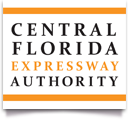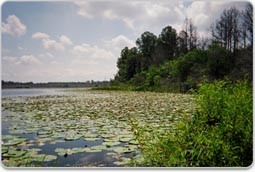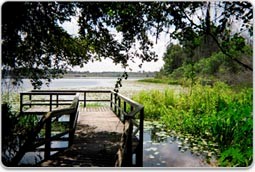

|
|
|
|
|
|
FREQUENTLY ASKED QUESTIONS
What is the Wekiva Parkway?
The Wekiva Parkway (State Road (S.R.) 429) is a 25-mile toll road that completed the beltway around metropolitan Orlando when all lanes were opened to traffic on January 27, 2024. Authorized in 2004 by the Wekiva Parkway and Protection Act (Chapter 369, Part III, F.S.), this expressway has been heralded for its innovative transportation planning and natural resource preservation, none more important than the Wekiva River Basin. Development of the Wekiva Parkway has included setting aside more than 3,400 acres of land for conservation. The parkway also includes numerous wildlife bridges and was constructed to be largely elevated to reduce accidents between vehicles and wildlife.
The parkway was developed jointly by the Florida Department of Transportation (FDOT) and the Central Florida Expressway (CFX). The Florida’s Turnpike Enterprise operates the FDOT sections. The last CFX parkway sections were completed in 2018.
How does Wekiva Parkway benefit me?
The Wekiva Parkway has reduced commute times by 10-15 minutes or more. The parkway is helping to relieve congestion on U.S. 441 and local roads including Plymouth Sorrento Road (County Road 437), Round Lake Road and Mount Plymouth Road (C.R. 435).
The Wekiva Parkway has helped reduce traffic congestion and enhance safety on S.R. 46 and other area roads. The risk of vehicle crashes has decreased, particularly on S.R. 46, by separating motorists driving between counties on the elevated expressway from those making shorter, more local trips on the at-grade frontage roads. The parkway's largely elevated construction and wildlife bridges have reduced collisions between vehicles and animals.
The parkway provides access to private properties and a non-tolled option for local trips from the C.R. 46A realignment in Lake County to Orange Boulevard (C.R. 431) in Seminole County. This was accomplished by a non-tolled service road parallel to the Wekiva Parkway.
The parkway features all electronic tolling, so motorists do not need cash. They can pay their tolls without slowing down or stopping.
A 10-mile multi-use trail runs parallel to the parkway, further enhancing access to the area's state-owned, natural lands for birders, hikers, bikers and others.
Where does the Wekiva Parkway go?
The parkway begins at the S.R. 429 (Daniel Webster Western Beltway)/S.R. 414 (John Land Apopka Expressway) interchange at the Connector Road just north of U.S. 441 in Apopka. From there it goes north past the Kelly Park Road interchange to a systems interchange at Plymouth Sorrento Road and Haas Road-Ondich Road, just south of the Orange County-Lake County line.
A connection from the systems interchange to the northwest, across the county line to connect with S.R. 46 near Round Lake Road opened to traffic on March 31, 2018. The other leg from the systems interchange heads east, paralleling Haas Road. At C.R. 435 the parkway veers northeast to connect to S.R. 46 east of Camp Challenge Road in east Lake County.
From there, the parkway continues east roughly along the S.R. 46 corridor, across the Wekiva River, to near Orange Boulevard in Sanford, before veering south to connect to Interstate 4 and S.R. 417.
Where can I get onto the Wekiva Parkway?
Interchange locations were kept to a minimum per the 2004 Wekiva Parkway & Protection Act to curb potential development in the natural area.
Completed interchanges include:
How much does it cost to drive on the Wekiva Parkway?
The Wekiva Parkway features all electronic tolling, so you will want to have an E-PASS or SunPass transponder to avoid paying a higher toll. Toll costs for the sections operated by each agency can be found at the following links:
How much did it cost to build the Wekiva Parkway?
This massive project cost $1.6 billion with $500 million of non-toll road improvements, including:
Through the partnership between the Central Florida Expressway Authority and the Florida Department of Transportation, the Wekiva Parkway was funded through the respective agency work plans.
Who lead the effort to build the Wekiva Parkway?
The Wekiva Parkway was a cooperative effort between the Florida Department of Transportation (FDOT) and the Central Florida Expressway Authority. CFX is primarily responsible for the Orange County portion, while the FDOT is responsible for the portions in Lake and Seminole counties. CFX completed its last sections in 2018. FDOT completed its last sections in 2024.
When was Wekiva Parkway opened to traffic?
With major construction complete, all Wekiva Parkway lanes were opened to traffic on January 27, 2024. Throughout the rest of the year, crews addressed minor finishing work and punch list items. A huge landscaping effort commenced that introduced thousands of native and Florida-friendly trees, shrubs, and other plants to the corridor. Today, sections of the Wekiva Parkway are maintained by their respective agencies, FDOT and CFX.
Were public meetings held for the Wekiva Parkway?
More than 30 public meetings and public hearings attended by nearly 8,000 people have been held for the project from the Project Development and Environment (PD&E) Study, through design and construction. CFX completed numerous public meetings for its sections in 2015.
FDOT in 2019 conducted the final project public meeting - a pre-construction open house for Section 7B, the final parkway section to get underway.
You can check out the recaps and materials from the various meetings by clicking here.
How did construction of the Wekiva Parkway impact the environment?
Authorized by the landmark 2004 Wekiva Parkway & Protection Act, development of the Wekiva Parkway included setting aside more than 3,400 acres of land for conservation. The large parcels purchased otherwise potentially could have been developed, encroaching upon the area's natural resources.
The now-completed Wekiva Parkway has enhanced regional mobility needs while minimizing impacts to the Wekiva River Basin and improving wildlife habitat connectivity between conservation lands. The parkway includes three wildlife bridges and new longer, higher-profile bridges over the Wekiva River. Together, the bridges provide approximately 7,900 feet of safe passage underneath travel lanes for animals. The previous two wildlife tunnels provided only about 80 feet of passage. Additionally, the parkway is largely elevated to reduce accidents between vehicles and wildlife. About one mile of C.R. 46A has been removed from the Seminole State Forest to eliminate conflicts between wildlife and vehicles.
Is there a trail along the Wekiva Parkway?
The Florida Department of Transportation built a 10-mile, multi-use trail along portions of Sections 4A, 4B, 5, 6 and 7A in Orange, east Lake and Seminole counties. The trail crosses over a new, high-profile bridge over the Wekiva River. The Wekiva Parkway trail ties into a proposed extension of the West Orange Trail in Orange County, the Lake-Wekiva Trail in Lake County and an extension of the Seminole-Wekiva Trail in Seminole County.
Approximately 7,700 feet of the trail was bridged along Section 6 – including a 2,000-foot bridge over the Wekiva River.
What does the bridge over the Wekiva River look like?The Wekiva River bridge is part of Section 6. The Florida Department of Transportation coordinated with local, state and federal officials, natural resource advocates and other key stakeholders to ensure the bridge helps to protect wildlife and the river, while also having a look that fits in with the context of the surrounding natural environment. You can learn more about the bridge design by clicking here.
How did the Wekiva Parkway impact the area economy?Using the Federal Highway Administration formula, we estimate that during design & construction, the Wekiva Parkway provided more than 35,000 jobs directly or indirectly related to the project.
How are tolls collected on the Wekiva Parkway?The parkway features all electronic tolling to maximize traffic flow and enhance motorist convenience. This cashless toll collection system allows motorists to pay their tolls at safe highway and ramp speeds, without having to slow down or stop.
Who do I contact if I have questions about the Wekiva Parkway?This website is the best resource for all Wekiva Parkway news and information. Fact sheets, project presentations and other materials are available for your convenience. If you need more help, please contact the project community outreach specialist at 407-710-5610 or at info@wekivaparkway.com.
|
|



